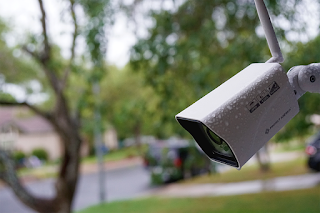IP Based Security Camera Systems:
An IP camera is a networked digital video camera that transmits data over a Fast Ethernet link. IP cameras (also called "network cameras") are most often used for IP surveillance, a digitized and networked version of closed-circuit television (CCTV).
 Advantages of IP Camera Systems:
Advantages of IP Camera Systems:
There are many advantages that an IP security camera system offers over an analog format. IP
security cameras send their signal over a network, allowing greater information transfer than an analog signal sent to a DVR. Some biggest advantages are:
1. Resolution
Whether cabled or wireless, CCTV systems that use an IP system have multiple advantages. They can record at a higher resolution. This means zooming in won’t create a blurry image, but can create a very clear one.
2. Analytics
A digital video recorder (DVR) on an analogue system can’t highlight events and save these out. To find a specific moment, you’ll have to play through all the footage until you find it. For security events that may happen overnight, that means scrubbing through hours of footage. An IP system can highlight or flag events for you based on specific parameters. These can include motion detection, tampering with the camera, and a range of other events
3. Scalability
An analog system limits you to the number of cameras you can hook up to a single DVR. You also need cabling for each individual camera. IP camera CCTV uses a network video recorder (NVR). This runs each camera in a certain range to a single switch. This switch can then run back to the NVR, saving substantially on cabling, installation, and maintenance costs. You can even use Power over Ethernet (PoE) to use certain types of signal cables to provide power to the cameras as well. This covers the power supply for the cameras.
Disadvantages of IP Camera Systems:
1. Privacy Is an Issue
Critics of security camera systems have taken offense to them being placed in offices and argued that doing so implies that the employer has either already assumed or is convinced that his employees are up to no good and will do something wrong which is why their activities need to be recorded.
2. It Can be a Costly Affair
While dummy cameras may not be expensive, the real ones costs hundreds, even thousands of dollars depending on the features and the number of cameras and monitoring systems you buy. Getting them installed and their maintenance means added costs. If you’re thinking of installing them yourself, lay that idea to rest unless you have good knowledge of wiring systems or you may end up damaging the cameras.
3. They Can be Vulnerable
When we, as users of security cameras, try to keep ourselves updated on the latest in security systems, we should not forget that intruders and criminals are doing the same too. A clever trespasser will probably know all about them and may have figured out a way to go undetected.
Further, tech-savvy criminals might have understood the technology and worked out ways to disable/disconnect them from their power source. Plus, if he detects your cameras as fake/dummies, they can be utterly useless in any crime prevention. This makes security cameras vulnerable to damage and/or misuse.
4. Can’t Stop Theft
Cameras enable users to record footage for later viewing, and to help nab criminals, and receive justice from the law. They cannot, however, stop a crime when it is in progress. They do not alert neighbors or the police like an alarm system would. This means that you will incur losses even as you run to the court, make insurance claims and reorder stolen inventory, which may no longer make you feel absolutely safe and even cause you to lose faith in them.


No comments:
Post a Comment